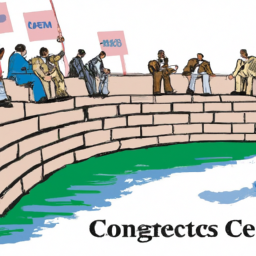Introduction to Parties as Linkage Institutions
Parties serve as essential linkage institutions within a democratic system, connecting citizens to the political process. They play a pivotal role in shaping policy outcomes and ensuring representation in governance. This article delves into the significance of parties as linkage institutions, examining their impact on political engagement and decision-making.
Definition and Function of Linkage Institutions
Linkage institutions serve as channels for the expression of citizens' preferences and interests, thus facilitating their representation in the political system. Parties act as intermediaries between citizens and the government, translating public demands into policy proposals and advocating for their implementation.
Parties and the Electoral Process
During elections, parties mobilize voters and provide platforms that outline their policy agendas. Through party identification, citizens align themselves with a set of principles and priorities, allowing parties to effectively channel their support and preferences into the electoral process. This strengthens the democratic system by ensuring a smooth transfer of power based on popular will.
Parties as Platforms for Diverse Interests
Parties act as platforms where diverse interests converge, representing various social, economic, and ideological groups. By aggregating these interests, parties can forge a consensus and articulate policy positions that cater to a broad spectrum of citizens, fostering inclusivity and reflecting the plurality of democratic societies.
Mobilizing Grassroots Movements
Parties serve as catalysts for social and political change by mobilizing grassroots movements. They provide organizational structures and resources that enable citizens to collectively advocate for their concerns. Through parties, ordinary citizens can influence the political agenda and push for policy reforms that align with their aspirations.
Parties and the Legislative Process
Once elected, parties play a pivotal role in the legislative process. They form the backbone of parliamentary systems, organizing lawmakers into cohesive units that can effectively deliberate, negotiate, and pass laws. Parties facilitate coordination, ensuring that the diverse opinions of legislators are streamlined into coherent policy proposals.
Parties and Interest Group Representation
Parties act as conduits for interest groups, allowing them to exert influence on policy outcomes. By aligning with parties that share their objectives, interest groups can effectively lobby for their concerns and shape the legislative agenda. Parties, therefore, play a critical role in balancing the interests of various stakeholders in the decision-making process.
Parties and Voter Mobilization
Parties engage in extensive voter mobilization efforts, encouraging citizens to participate in the political process. They organize rallies, canvassing activities, and voter registration drives, ensuring that citizens are informed, motivated, and empowered to exercise their democratic rights. This enhances political engagement and strengthens the democratic fabric of a nation.
Parties as Agents of Governance
Parties are not only instrumental during elections but also in governance. They provide stable platforms for policy implementation, ensuring continuity and coherence in policymaking. Parties serve as vehicles for accountable leadership, allowing citizens to hold elected officials responsible for their actions and policy decisions.
Conclusion
Parties are crucial linkage institutions that bridge the gap between citizens and the political system. Their role in mobilizing voters, representing diverse interests, and shaping policy outcomes is essential for the functioning of a vibrant democracy. Recognizing and strengthening the role of parties as linkage institutions is vital for ensuring citizen engagement, representation, and effective governance.
